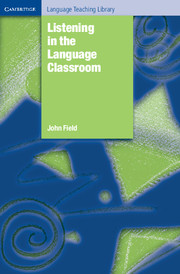Book contents
- Frontmatter
- Contents
- Dedication
- Acknowledgements
- Introduction
- Part I Background
- Part II Rethinking the comprehension approach
- Part III Process, not product
- 5 A diagnostic approach to L2 listening
- 6 Dividing listening into its components
- 7 A process approach
- Part IV A process view of listening
- Part V The challenge of the real world
- Part VI Conclusion
- Appendices
- Glossary of listening-related terms
- References
- Index
- References
6 - Dividing listening into its components
Published online by Cambridge University Press: 01 October 2009
- Frontmatter
- Contents
- Dedication
- Acknowledgements
- Introduction
- Part I Background
- Part II Rethinking the comprehension approach
- Part III Process, not product
- 5 A diagnostic approach to L2 listening
- 6 Dividing listening into its components
- 7 A process approach
- Part IV A process view of listening
- Part V The challenge of the real world
- Part VI Conclusion
- Appendices
- Glossary of listening-related terms
- References
- Index
- References
Summary
Know how to listen, and you will profit even from those who talk badly.
Plutarch (46–127? CE), Greek biographerIn the last chapter, a diagnostic approach was outlined, where we treat the answers to questions as a source of information about learner behaviour rather than a means of judging performance. One drawback was briefly considered: the fact that, with a large class, it may not be possible to discover every individual's concerns and problems. Another limitation is that a diagnostic approach depends upon a constant and reliable supply of feedback from learners. It constitutes a response by the teacher to the somewhat unpredictable outcomes of the listening class rather than providing a basis for an extended and systematic programme of listening training.
A possible alternative is to practise the relevant processing routines before exposing listeners to longer stretches of the second language. Instead of providing targeted practice at a point where unproductive patterns of behaviour may have become quite strongly entrenched in the learners, the teacher employs exactly the same kind of micro-listening activities as part of an extended programme of listening development.
This is an attractive idea because it deals with the criticism that the comprehension approach provides practice and more practice but does little in any systematic way to ensure that learners' listening skills improve. The goal is to guide learners from the outset into acquiring behaviour that is appropriate to listening to a second language generally and listening to the target language in particular.
Information
- Type
- Chapter
- Information
- Listening in the Language Classroom , pp. 96 - 109Publisher: Cambridge University PressPrint publication year: 2009
